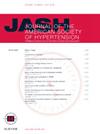Impact of masked hypertension on diabetic nephropathy in patients with type II diabetes: a KAMOGAWA-HBP study
Abstract
The prognostic significance of masked hypertension (MH) on the progression of diabetic nephropathy among patients with type II diabetes is not well documented. We examined the relationship between clinic systolic blood pressure (SBP) and morning home SBP measurements and progression to macroalbuminuria in patients with type II diabetes. We analyzed prospective cohort study data from 712 patients with type II diabetes. We classified the patients into the following four groups according to their clinic (130 mm Hg) and home (125 mm Hg) SBP measurements: controlled blood pressure group, white-coat hypertension group, MH group, and sustained hypertension (SH) group. The patients were instructed to perform triplicate morning and evening blood pressure measurements for 14 consecutive days. During the 2-year follow-up period, 23 patients progressed to macroalbuminuria. The unadjusted odds ratio (95% confidence interval) for progression to macroalbuminuria among the patients with MH was significantly higher than that among the patients with controlled blood pressure (8.89 [1.06–74.88]). No significant relationship was observed between white-coat hypertension or SH and progression to macroalbuminuria. In analyses adjusted for various potential confounders, the adjusted odds ratio for progression to macroalbuminuria in the MH group was more than 8-fold higher than that in the controlled blood pressure group. MH might be a predictor of progression to macroalbuminuria among patients with type II diabetes. This rate of progression is comparable with or greater than the results reported for patients with SH.

 求助内容:
求助内容: 应助结果提醒方式:
应助结果提醒方式:


